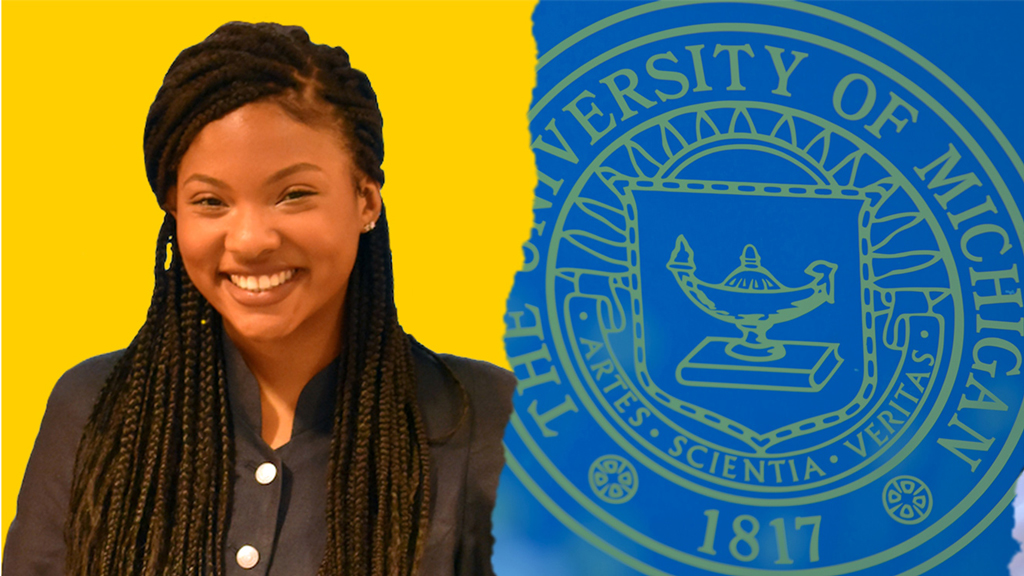By Eric Gallippo | Art by Adam Beeman
After earning her bachelor’s degree and teaching out of state, Sarah Radden (Dentistry Class of 2022) was ready to come home to Michigan and focus on her original passion: teeth. Along the way, she’s also working to make sure more underrepresented students, like herself, also have a seat at the dentist’s chair.
As a kid growing up in Detroit, Sarah loved getting her teeth cleaned and asking her friend’s dentist father questions about his job.
“For as long as I can remember, I’ve always wanted to be a dentist,” she said. “I just always liked people’s teeth.”
In practice, Sarah finds dentistry to be a rewarding balance of artistic creativity and scientific discovery. But most importantly, it’s a way to help others.
“Sometimes people are very self-conscious of their smiles,” she said. “I love being able to restore that confidence.”
It took time to build her own confidence, but after graduating from Howard University and working with Teach for America in New Orleans, Sarah decided to finally give dentistry her best shot. Things soon started falling into place when she learned about the U‑M School of Dentistry’s Profile For Success program. The six-week residency for disadvantaged and underrepresented students covers tuition, housing, and a stipend so students can focus on preparing for the Dental Admission Test.
“It was literally everything to help you be successful on your path to dental school,” she said.
Sarah soon found herself back in Michigan, attending the top dentistry school in the country, with her family support system nearby. But even with in-state tuition rates and some government assistance, financial uncertainty loomed like a “dark cloud.”
“I’m older, I’m not traditional. There is going to be a time when I run out of money,” she recalled telling a friend.
That’s when her friend told her about the Alumnae Council Scholarships. Awarded to women graduate students of high academic achievement and demonstrated financial need, the Alice Crocker Lloyd Alumnae Scholarship not only helped Sarah focus on her own studies, patients, and many exams, but also advocate for others.
“The scholarship has helped me so much financially, so I’m very grateful for that,” she said. “I’ve also been telling other students who didn’t know about it, because we’re all in this together. I’m not the only person who feels finances are such a struggle.”
In addition to getting the word out about scholarship opportunities, Sarah also actively works to “create a cohesive community” within the dentistry school and help others overcome the struggles she’s felt as the only Black woman in her graduating class.
Sarah is currently president of the U‑M chapter of the Student National Dental Association—an organization dedicated to increasing the presence of minorities in the dental field—and co-chairperson of the school’s Diversity, Equity, and Inclusion Multicultural Affairs Committee. She’s also been active in the Women’s Dentistry Alliance.
Through the dentistry school’s Immersion Pathways program, Sarah has researched how dentistry students’ upbringings affect their attitudes about diversity. Her project found that dental students from less diverse backgrounds were less likely than those from more diverse neighborhoods and schools to consider diversity important.
Sarah wants this work to continue through further research, publications, and systemic changes that remove barriers to students from underrepresented communities. She said while African-American and Hispanic-American students are applying to dental school, the majority of students accepted are white. She hopes to see this disconnect disappear, not just for the students’ sake, but also for the communities they might serve. Sarah said studies prove that African-Americans and Hispanic-Americans are more likely to work in neighborhood clinics and Federally Qualified Health Centers (FQHC) in low-income urban and rural communities.
“It’s important that we have this representation and these opportunities, because this is who comes back and helps close health disparities,” she said. “It’s all connected.”
After graduation, Sarah plans to move home to Detroit and work with low-income patients, most likely through an FQHC. She’s also interested in working with prison dentistry programs. She hopes to be an example to young patients of who they can be if they want to someday.
Her message to them: “I grew up in Detroit, I went to Detroit Public Schools, and I’m here,” she said. “You can be here, too.”
